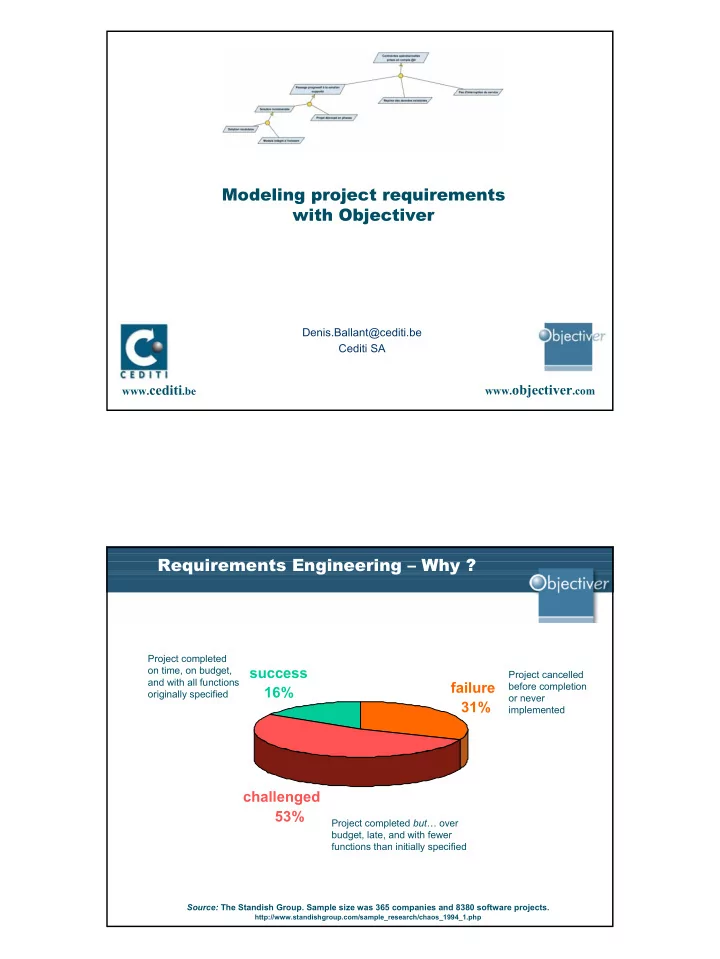

Modeling project requirements with Objectiver Denis.Ballant@cediti.be Cediti SA www. cediti .be www. objectiver .com Requirements Engineering – Why ? Project completed on time, on budget, success Project cancelled and with all functions failure before completion 16% originally specified or never 31% implemented challenged 53% Project completed but … over budget, late, and with fewer functions than initially specified Source: The Standish Group. Sample size was 365 companies and 8380 software projects. http://www.standishgroup.com/sample_research/chaos_1994_1.php
Reasons for Project Failures Lack of User Input 13 % Incomplete Reqs & Specs 12 % Changing Reqs & Specs 11 % Req Eng’s Lack of Executive Support 8 % Domain Technology Incompetence 7 % Lack of Resources 6 % Unrealistic Expectations 6 % Unclear Objectives 5 % Unrealistic Time Frames 4 % New Technology 3 % The KAOS approach A goal-driven approach to requirements engineering – Elicitation Notation – Structuring – Specification – Analysis KAOS – Negotiation – Communication Method Tool – Documentation Objectiver – Evolution
Involved organizations Research University of Louvain (B) Private company: Non-profit applied - Consulting services research organization: - Objectiver vendor - formal tools (FAUST) Market
Main Views Generated requirements document Model editor Generated web documentation Process Existing Interviews Documents systems Analysis Modeling Verifications & Checks KAOS model Queries Validation Web Requirements document documentation
1> Interviews IOP Rewrite Project 2> Identify Goals
3> Specify Goal Properties 4> Build Goal Model + responsibility, object, and operation models
5> Generate Reqs Document 6> Amend Reqs Document
7> Publish Reqs Document Output formats: - RTF (MS-Word, …) - PDF (Acrobat) Support for Model Checking & Validation • Automatic Model Validation • Extensible manually-triggered OQL queries • Report & Diagram generation • Validation based on the generated Web documentation
Automatic Model Checking Conformance to KAOS syntax verified on the fly OQL-Supported Model Checking • Query Language (OQL extension) • Model completeness checking – goals not refined (wishful thinking) – requirements without a responsible agent – requirements not “operationalized” – unresolved obstacles – … • Model quality checking – concepts not used in any document – incomplete concept specification – concepts with unresolved Issues – …
Report generation Diagram generation Responsibility model generated based on the goal model Validation with experts : model browser Indexes Diagram viewer Property Text viewer viewer Concept references are hyperlinks
Should I use Objectiver ? • Elicit and specify requirements in a systematic way • Produce structured, motivated, easy to understand requirements documents • Facilitate communication • Simplify validation process • Provide traceability from: – Requirements to goals – Operations to requirements cetic FAUST Project Kaos Formal Editing Model Checking Pattern reuse Animator Acceptance Test Case Generator Obstacle Generator / Resolver Consistency / Completeness Analyser
Cediti References � Requirements analyses & Reengineering � Requirements documents � Strategical plans & IT plans Get your free trial version now ! www.objectiver.com
Recommend
More recommend